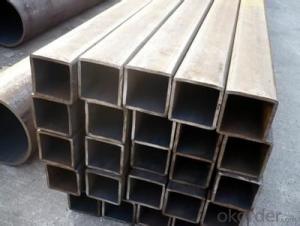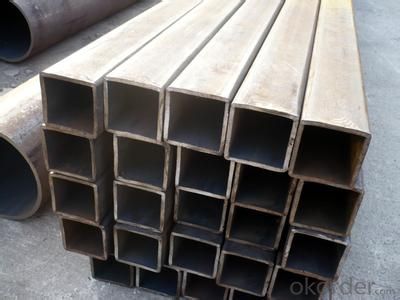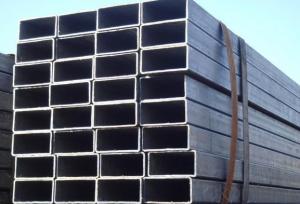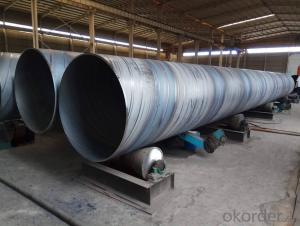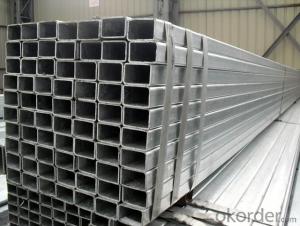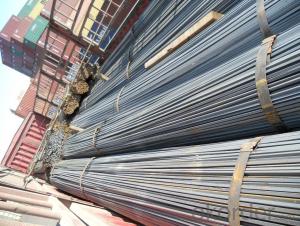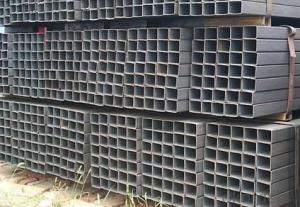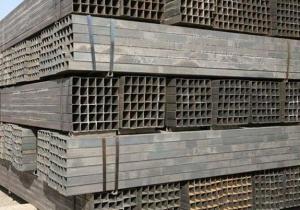Rectangular Hollow Section Q235
- Loading Port:
- China Main Port
- Payment Terms:
- TT OR LC
- Min Order Qty:
- -
- Supply Capability:
- -
OKorder Service Pledge
OKorder Financial Service
You Might Also Like
Product Name | ||
Size | Size: | 10*10--500*500mm |
Thickness: | 0.45--16mm | |
Length: | 3-12m | |
Steel Grade | Q195,Q215,Q235,Q345,16Mn, 20# | |
Standard | ASTM A500,EN10219,GB/T6728,GB/T6725,JIS G3466 | |
Usage | 1. For Structure, Airport, Railway 2. Construction and so on. | |
Ends | Plain end or By Your Choice | |
Surface | Bared Or With Oiled Or Galvanized | |
Technique | ERW ,Hot Rolled and Cold Rolled | |
Section Shape | ||
Inspection | With Hydraulic Testing, Eddy Current , Infrared Test | |
Package | Bags, Bundle, In Bulk, Containers | |
MOQ | 20 Metric Ton / Can Be Negotiated | |
Supply Ability | 15,000 Metric Ton/Month | |
Date of Delivery | 7 days(Qty within 1000 Metric Ton) or According To The Quantity | |
Port of Shipment | Tianjin, China | |
Payment | L/C T/T | |
- Q: Can steel pipes be used for the construction of offshore platforms?
- Yes, steel pipes can be used for the construction of offshore platforms. Steel pipes are commonly used in offshore platforms due to their durability, strength, and resistance to corrosion. They can be utilized for various purposes such as structural support, transportation of fluids, and installation of equipment. Additionally, steel pipes are readily available, cost-effective, and can withstand the harsh marine environment, making them a suitable choice for offshore platform construction.
- Q: Can steel pipes be used for fire sprinkler systems?
- Yes, steel pipes can be used for fire sprinkler systems.
- Q: What is the difference between carbon steel and cast iron pipes?
- Carbon steel and cast iron pipes are both widely used in various industries for different applications. The main difference between these two types of pipes lies in their composition and properties. 1. Composition: Carbon steel pipes are primarily made of iron and carbon, with trace amounts of other elements such as manganese, phosphorus, and sulfur. On the other hand, cast iron pipes are made by melting iron and adding a small amount of carbon, usually between 2-4%. 2. Strength and Durability: Carbon steel pipes are generally stronger and more durable than cast iron pipes. Carbon steel has a higher tensile strength, which means it can withstand higher pressures and is less likely to be damaged or deformed. Cast iron, although strong, is more brittle and prone to cracking. 3. Corrosion Resistance: Carbon steel pipes require additional coatings or treatments to protect them from corrosion. Without proper protection, carbon steel pipes can be susceptible to rust and corrosion, especially when exposed to moisture or aggressive substances. On the other hand, cast iron pipes have inherent corrosion resistance due to the formation of a protective layer of iron oxide (rust) on their surface. 4. Weight and Installation: Cast iron pipes are typically heavier than carbon steel pipes, making them more challenging to handle and install. Carbon steel pipes are comparatively lighter, allowing for easier transportation and installation. 5. Noise and Vibration: Cast iron pipes have superior sound-deadening properties, making them quieter when fluids flow through them. On the contrary, carbon steel pipes tend to transmit more noise and vibrations. 6. Cost: Cast iron pipes are generally more expensive than carbon steel pipes due to the additional manufacturing processes and the higher cost of raw materials. In summary, the main differences between carbon steel and cast iron pipes lie in their composition, strength, corrosion resistance, weight, noise transmission, and cost. The choice between the two depends on the specific application, budget, and environmental factors.
- Q: What are the different methods of coating steel pipes for insulation?
- There are several methods of coating steel pipes for insulation, each with its own advantages and disadvantages. 1. Thermal Insulation Coating: This method involves applying a layer of thermal insulation material, such as mineral wool or foam, onto the steel pipe. The insulation material helps to reduce heat transfer and minimize energy loss. Thermal insulation coatings are relatively easy to apply and can provide excellent insulation properties. However, they may be prone to degradation over time and may require regular maintenance and replacement. 2. Corrosion Protection Coating: Steel pipes are often coated with corrosion protection materials, such as epoxy or polyethylene, to prevent rust and corrosion. These coatings act as a barrier between the steel surface and the surrounding environment, protecting the pipe from moisture, chemicals, and other corrosive elements. Corrosion protection coatings are typically durable and long-lasting, providing effective protection for the steel pipe. However, they may not provide significant thermal insulation properties. 3. Fusion-Bonded Epoxy (FBE) Coating: FBE coating is a popular method for both insulation and corrosion protection. It involves applying a layer of epoxy powder to the steel pipe and then heating it to create a strong, durable bond. FBE coatings provide excellent adhesion and resistance to corrosion, as well as some thermal insulation properties. They are commonly used in oil and gas pipelines and can withstand high temperatures and harsh environments. 4. Polyurethane Foam Coating: Polyurethane foam is often used as an insulation coating for steel pipes. It is applied by spraying or injecting the foam onto the pipe surface, which then expands and hardens to create a protective layer. Polyurethane foam coatings provide excellent thermal insulation properties and can be applied to pipes of various sizes and shapes. However, they may require special equipment and expertise for application and may be susceptible to physical damage or moisture absorption if not properly sealed. 5. Ceramic Coating: Ceramic coatings are another option for insulating steel pipes. These coatings are typically applied using a thermal spray process, which creates a layer of ceramic material on the pipe surface. Ceramic coatings can provide high-temperature insulation, corrosion resistance, and thermal shock protection. They are commonly used in industries such as power generation and aerospace, where extreme temperature conditions are present. However, ceramic coatings can be expensive and may require specialized equipment and expertise for application.
- Q: Can steel pipes be used for solar power systems?
- Indeed, solar power systems can utilize steel pipes. In the realm of solar power systems, steel pipes find widespread usage in diverse applications such as constructing support structures, mounting systems, and piping systems for circulating heat transfer fluids. The reason behind the preference for steel pipes lies in their robustness, longevity, and ability to withstand various environmental conditions. These pipes possess the capability to bear the weight of solar panels and support structures, as well as endure the impact of wind and other external elements. Moreover, steel pipes can be easily tailored and welded to cater to specific project requirements. All in all, when it comes to solar power systems, steel pipes emerge as a dependable and cost-efficient alternative.
- Q: What are the common problems or issues faced with steel pipes?
- Some common problems or issues faced with steel pipes include corrosion, leaks, blockages, and wear and tear. Corrosion can occur due to exposure to moisture or chemicals, leading to rust and weakening of the pipe. Leaks can arise from faulty connections or cracks in the pipe, resulting in water or gas leakage. Blockages can occur due to the accumulation of debris or mineral deposits, hindering the flow of fluids. Over time, steel pipes can also experience wear and tear, leading to erosion or cracks, which may require repair or replacement.
- Q: How are steel pipes used in the marine industry?
- Steel pipes are widely used in the marine industry for various applications such as shipbuilding, offshore structures, and underwater pipelines. They provide strength, durability, and corrosion resistance, making them suitable for transporting fluids, gases, and other materials in harsh marine environments. Steel pipes are also used for constructing piers, docks, and oil rigs, as well as for supporting and reinforcing marine structures.
- Q: What are the factors to consider when selecting a steel pipe for a specific application?
- When selecting a steel pipe for a specific application, there are several key factors to consider. These include the desired strength and hardness of the pipe, its corrosion resistance, its ability to withstand high temperatures or extreme conditions, its compatibility with the intended fluid or gas, the required dimensions and specifications, as well as the cost and availability of the pipe. It is also important to assess the specific requirements and demands of the application to ensure the selected steel pipe will meet the desired performance and longevity.
- Q: Are steel pipes resistant to impact or external forces?
- Yes, steel pipes are generally resistant to impact and external forces. Steel is known for its high strength and durability, making it an ideal material for various applications, including pipes. Steel pipes have the ability to withstand external forces such as impact, pressure, and vibrations. They are often used in industries that require reliable and sturdy piping systems, such as oil and gas, construction, and infrastructure. Additionally, steel pipes are less prone to cracking or breaking under extreme conditions compared to other materials. However, the resistance to impact and external forces may also depend on the specific grade and thickness of the steel used in the pipes.
Send your message to us
Rectangular Hollow Section Q235
- Loading Port:
- China Main Port
- Payment Terms:
- TT OR LC
- Min Order Qty:
- -
- Supply Capability:
- -
OKorder Service Pledge
OKorder Financial Service
Similar products
Hot products
Hot Searches
Related keywords
